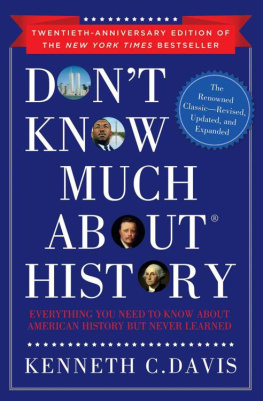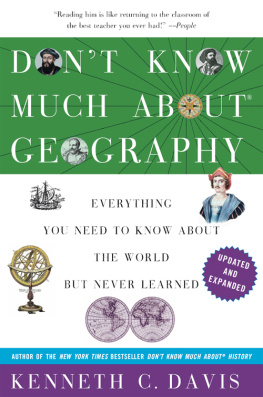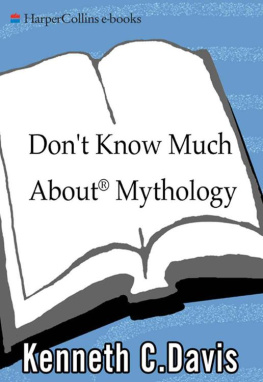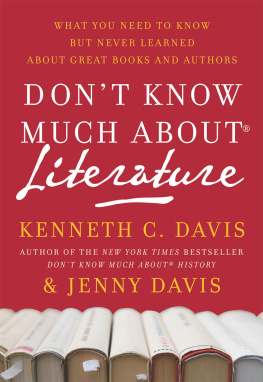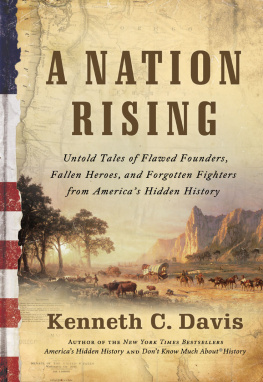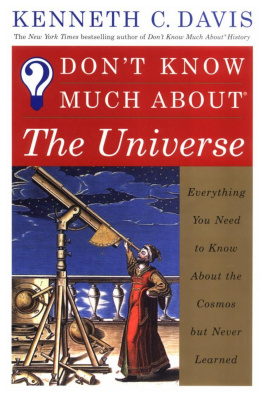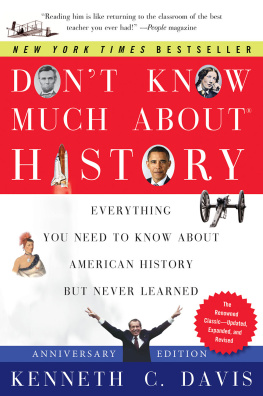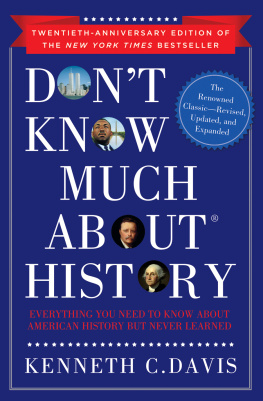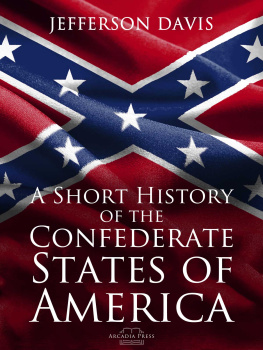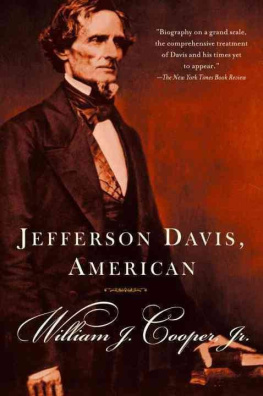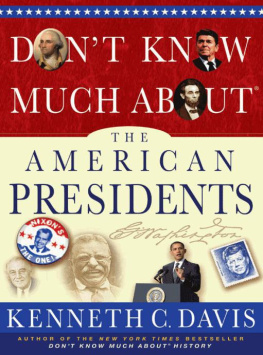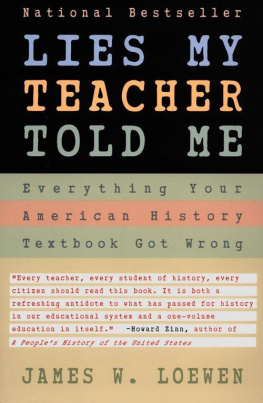DONT KNOW
MUCH ABOUT
HISTORY
ANNIVERSARY EDITION
EVERYTHING
YOU NEED TO KNOW
ABOUT AMERICAN HISTORY
BUT NEVER LEARNED
KENNETH C. DAVIS

To my children, Jenny and Colin
Contents
An Era of Broken Trust
W hen Dont Know Much About History was first published in 1990, it was simply meant to serve as a fresh new take on American history. Busting myths, with a dose of humor and real stories about real people, the book was conceived as an antidote to the dull, dreary textbooks we suffered through in high school or college. A year later, in July 1991, the book began a run of thirty-five consecutive weeks on the New York Times best-seller list, proving perhaps that Americans dont hate historythey just hate the dull version they got back in high school.
In 2002, the book was revised and greatly expanded. Now, at the end of 2010, this newly updated edition picks up where that second revision left offwith the bizarre drama of the 2000 presidential election and the immediate aftermath of the September 11, 2001, terror attacksand brings American history through a churning period of war, calamity, and dramatic upheaval that culminated with the historic 2008 election of Barack Obama and his first year and a half in office.
So whats different about this new revised, updated version? Like the original book and the previous revision, this new edition is organized along chronological lines, moving from Americas discovery by Europeans to more recent events, including the first Gulf War, the end of the Cold War, the enormous repercussions of September 11, 2001, and the election of the nations first African American president. But the books final chapter, which was initially written for the 2002 edition, has been significantly expanded to include a review of the extraordinary events that have taken place since 2001, a brief period that has produced some of the most remarkable changes in Americas history.
Much of this new history reflects on the response of the United States to the calamity of 9/11 and how that day has transformed American life and society, from the way we get through airports to fundamental American attitudes about the right to privacy versus a sense of greater security. The new material begins with an overview of 9/11 and what has been learned about that day of infamy after nearly a decade. This revision goes on to recap the response of the Bush administration to 9/11, with particular emphasis on the invasions of Afghanistan and Iraq.
In addition, this added material includes discussions of the following events and controversies:
The emergence of same-sex marriage as a highly divisive, emotional national issueThe failure of government at every level in responding to Hurricane Katrina, Americas worst natural disasterThe meltdown of the global economy and the Great Recession and the historic involvement of the government in rescuing companies, such as General Motors and Citibank, deemed too big to failThe surprisingly meteoric rise and election of Barack Obama
Besides adding material to cover events that have occurred since this book originally appeared in 1990, I have amplified some of the existing material. This sort of historical revision is a necessity because we learn things about the past all the time, often based on new scholarship, scientific advances, and ongoing discoveries that reshape our view of history. For instance, new light has been cast on familiar stories, such as the continuing archaeological dig that is revealing new information about the original fort at Jamestown, Virginiafirst discovered in 1996or the DNA evidence that strongly suggests that Thomas Jefferson had fathered the children of slave Sally Hemingsa nineteenth-century political rumor now treated as near certainty, even at Monticello, Jeffersons home in Virginia.
This revision also reflects the fact that court decisions can greatly alter American life. A bevy of judicial decisions around the nation during the past eight years has forced a major debate on same-sex marriage as well as the Pentagons dont ask, dont tell policy toward homosexuals serving in the military. And in June 2008, the majority on an increasingly conservative Supreme Court struck down a Washington, D.C., ban on handguns in a historic reinterpretation of the Second Amendment and the right to bear arms that may impact gun-control laws in most American states.
Finally, history needs to be revised because even old dog historians learn new tricks. For instance, in researching and writing two of my recent books, Americas Hidden History and A Nation Rising , I uncovered some surprising hidden history in such stories as the fate of the true first PilgrimsFrench Huguenots who settled in Florida fifty years before the Mayflower sailed and were wiped out by the Spanish in 1565. Or the story of Philadelphias anti-Catholic, anti-immigrant Bible Riots of 1844, another episode missing from most American schoolbooks. This revision now reflects these significant but overlooked events.
When I last revised this book in 2002, I concluded by writing:
And yet, how much had really changed? Congress still fights over obscure bills. Children still go missing. The stock markets gyrations transfix the nation. But something fundamental seems to have changed. Historians may look back at America in late 2002 as the Era of Broken Trust. In a very short space of time, Americans had lost faith in government agencies, including the FBI and the CIA. The church, in particular the Roman Catholic Church, was devastated by a string of revelations about predatory priests. Corporate bankruptcies and revelations of corruption involving Enron, Tyco, Global Crossing, and WorldCom, among others, shattered Americas faith in the financial security of the nation.
As we know, that paragraph has become, if anything, even more salient in 2010. The Era of Broken Trust I described at the beginning of the twenty-first century has only worsened as the events of the past decade have further eroded many Americans belief and confidence in the nations most basic institutions. The tremendous upheaval in the global economy shook our trust in the financial institutions and the government agenciesmany born out of the Great Depressionthat were supposed to regulate and police them. The deceptions and mistaken assumptions that led to the invasion and occupation of Iraq continued to weigh the nation down in a costly war. The response to Hurricane Katrina at every level of government was a national disgrace that called into question the ability and commitment of people entrusted with the nations basic safety. And the woes of the Gulf Coast following Katrina were compounded in 2010 by one of the worst environmental disasters in American history: an oil well nearly a mile beneath the surface of the Gulf of Mexico relentlessly spewed crude oil, befouling beaches, destroying sensitive ecosystems, killing wildlife, and ruining businesses in a catastrophe whose ultimate costs and long-term impact may never be fully known.
Perhaps the best summary of what this period in our history may mean is captured in something President George Bush said on Good Morning America on September 1, 2005, during the Katrina catastrophe: I dont think anyone anticipated the breach of the levees.
Of course, that was not true, as ample evidence has shown. There had been plenty of cautions about the levees from the public officials, engineers, and academics who had warned of the dangers confronting New Orleans as its protective barrier islands were eliminated by development and the levees ringing a city below sea level were deemed insufficient in the face of a major storm. Similarly, many danger signs had been posted about a raft of other protective levees that have also been breachedthe risks to the financial system, or the concerns about offshore drilling, and the dire warnings about going into Iraq without justification and without proper troop levels.
Next page
